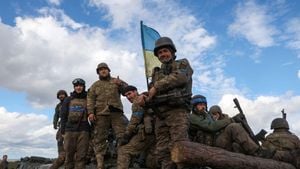Recent developments reveal the mounting challenges Russian President Vladimir Putin faces domestically and internationally, as his grip on the country becomes increasingly strained. With inflation surging and the Russian ruble plummeting to alarming lows, the state of Russia's economy has reached levels not seen since the early days of the Ukraine conflict.
The ruble's value has again dipped sharply, hitting 109.5 rubles per dollar after what has been dubbed "Black Wednesday." This recent freefall marks its weakest position since March 2022, when Western sanctions first sent the currency spiraling. At the start of Putin's invasion of Ukraine, the ruble was trading around 80 rubles per euro, but is now facing unprecedented depreciation due to the combination of military spending and reliance on imports.
Despite these economic woes, Putin has been adamant, stating, “It is not easy, neither in our country nor in neighboring countries, but everything is under control, everything is going according to plan.” He continued reassuringly, “There is absolutely reason for panic.” Yet, many Russian citizens are feeling the direct fallout from the economic crisis.
Currently, annual inflation is reported at 8.77%, but many experts believe the real figure may be significantly higher. The Central Bank’s measure of “inflation perception” suggests people view year-on-year inflation at about 15.3%, with independent studies hinting at even steeper increases. Retailers are preparing for another wave of price hikes, especially as major distributors are slated to raise prices by around 10% from December 2.
One of the biggest drivers of this inflation is Russia's over-dependence on imports, which the Kremlin had once hoped to replace with domestic products. This strategy has backfired for the most part, except for certain food sectors. Dmitry Shashkin, the general director of Kuppersberg, one of the distributors affected, pointed out the challenges by saying, “We have been trying to curb the hikes over the past two months, but the current conditions no longer allow it.”
The economic strain is hurtling toward the Russian consumer as Russia’s national railway company is preparing to raise passenger ticket prices by 11.6% and freight costs by 13.8%. This sharp increase will likely raise the costs of importing goods from Asia, which is now Russia’s primary trading partner due to U.S. sanctions creating hurdles with other markets. The expectation is grim, as some insiders predict consumer goods prices could soar by up to 20% by early January.
According to industry analysts, the economic toll is compounded by the extensive budgetary commitments to military expenditures—nearly one-third of the overall budget is allocated to war-related costs, reflecting Putin’s prioritization of the Ukraine conflict. This situation has created volatility as the government works simultaneously to meet domestic needs and sustain military operations abroad.
Putin’s government is clearly feeling the pressure, evident from his recent visit to Kazakhstan highlighted by evasive responses concerning the ruble's decline. Dmitry Peskov, Putin’s spokesperson, sidestepped the issue by emphasizing Russia's trade agreements, asserting satisfaction with current currency operations. Meanwhile, the Central Bank struggles to control the situation, having raised interest rates dramatically to 21% to temper inflation, yet it has decided not to intervene directly to support the ruble.
The future looks uncertain as the Kremlin grapples with these economic pressures. Sergei Dubinin, former head of the Central Bank, has warned inflation is likely to stay as “long-term challenge.” His comments draw attention to the potential parallels with other nations struggling under similar conditions. Notably, Turkey has contended with inflation rates around 50% for several years, which could suggest Russia might be heading toward similar sustained economic distress.
Adding to the pressures created by the international sanctions is the news of renewed U.S. sanctions targeting key sources of foreign currency for the Kremlin. This includes sanctions on numerous banks tied to the Kremlin, which have made it even harder for Russia to stabilize its economy. The U.S. Treasury Department's recent moves to target banks like Gazprombank—which is significant for access to foreign trade—have compounded Russia's already challenging situation.
The sanctions have also drawn “friendly” nations, like Turkey and Iran, to halt exports to Russia temporarily, fearing chaos stemming from the ruble's collapse could affect their economies too. This short-term fallout could severely affect availability and pricing of everyday goods for the average Russian consumer.
Despite the persistent challenges he faces, Putin remains undeterred. He has characterized the economic difficulties as temporary inconveniences, with long-term strategies still firmly centered on military expansion and regional control. Meanwhile, as inflation escalates and the ruble continues its downward spiral, the Kremlin's ability to manage both internal pressures and external conflicts will be put to the ultimate test.
Internationally, Putin's standing remains precarious, especially as the conflict with Ukraine drags on with no sign of resolution. The Kremlin's strategy of military intimidation and economic isolation is facing backlash, not only from Western nations but also from key partnerships within neighboring countries. The ramifications of the war extend beyond the battlefield, significantly impacting international relations and domestic stability.
Putin's rhetoric of reassurance juxtaposes sharply with the daily struggles faced by Russian citizens amid rising prices and economic decline, creating significant domestic unrest. His claims of stability may not hold for long if inflation continues its course and economic hardships worsen. The contradiction between the Kremlin’s narrative and the reality experienced by the public marks the challenges faced by Putin as he threads the needle between maintaining power and addressing the fundamental issue of his country’s financial state.
With various factors complicantly intertwining—sanctions, military expenditure, inflation, and the geopolitical chessboard—Putin’s hurdle is not merely to assert control over the economy but to preserve the delicate fabric of support and stability his leadership requires. Time will tell if his pronouncements of control will withstand the test of growing dissent and economic hardship.



